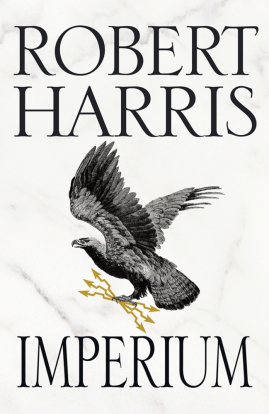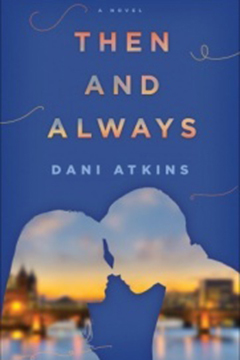
I much prefer this cover… most of them look like airport thrillers.
So… it may be known that I am a woman of predictable tastes. And it may be known that “Cicero” fits very very neatly into them. So it’s no shock I adored Imperium. I mean, also the fact I’d read it before, but that was yeeears ago so sort of doesn’t count. It was before I knew enough Roman history to have valid opinions. Reading it again, as an adult… I just loved it.
I’ve sort of been meaning to reread it for a while, but the thing that spurred me into it is the fact we’re going to see the two plays based off Harris’ Cicero trilogy in Stratford next month. We saw a five star review of them and it jut massively kicked off my excitement all over again (we booked the tickets months ago; I got distracted) and I just couldn’t help myself but dive in in preparation. And then I’ve been glued to the book for a couple of days.
It’s not so much that it’s some perfectly accurate piece of history in narrative form, as obviously there’s artistic licence going on… but like HBO’s Rome, it manages to transcend the issues of historical fact and nitpicking by just getting, for me, the tone dead right. Rome cuts things, changes things, messes around all over the place… and yet it feels so perfectly and precisely right on a more fundamental level that I’m willing to forgive a lot of not-necessarily-quite-accurate-on-the-details. I’m not just a pedant, ok? And this falls into the same bracket. Mainly because Cicero feels like Cicero. And yes, there are errors (or things I think might be errors and I just haven’t checked). But… eh. I always liked reading Cicero himself, and part of that is because you often get quite a strong sense of personality coming through*. And you get that here too – especially the recurring notion that Cicero can’t help but undermine himself by saying something witty and cutting when maybe, just maybe, he’d have been better off keeping it to himself. It’s delightful.
That all being said, and it also being said that I gave it five stars on Goodreads without a second thought, in some ways, I did think it wasn’t quite up to par with McCullough’s First Man in Rome etc. series. Harris’ work feels like it lacks depth, when I compare the two. Though I suppose, realistically, that’s what you get for only writing 400 pages compared to the umpteen thousand per book McCullough manages. And she encompasses a wider cast, all of whom get their depth and breadth and development, whereas Harris’ brevity by necessity calls for a monofocus on Cicero himself. And Tiro, to an extent, but that too is an issue. Because Tiro is… I suppose, he’s unfamiliar. He’s not a historical figure I know so much about. And I’m reading this precisely for the comfort of “omg it’s Cicero”, so Tiro sometimes gets in the way? Which is a shame, because he’s a very pleasant narrator in a lot of ways, and there are moments where it’s obvious how a) Harris has taken care to root his attitudes in his time and b) Harris has taken care to notice the differences between the attitudes of the time of Tiro writing (i.e. in old age, post-civil-war-shenanigans) and the time of the events of the narrative. Had I come to him cold, as a new character in a new story, I think I’d be really very fond of him indeed. And I don’t dislike him. But there are moments when I wish we’d just dispensed of the conceit of a known third person from whose perspective all things are told and discussed, because maybe then, just maybe… we’d have more got into the mind of Cicero himself.
Yes, yes, alright, I know… I’m biased. I just really like Cicero, ok?
One of the things I really did enjoy, if I move slightly away from historical fangirling, is the pacing. Harris has spaced things out according to Cicero’s career, and it gives each section a really good dramatic build and climax, without being over-drama. But on the flip-side, it has enough drama that even though I know which elections Cicero is going to win, it still feels compelling reading. I still want to know how he solves the problem and how he pulls through in the end, even if I’m denied the drama of uncertainty. And I feel like if I didn’t know? It would have been really well played out.
I think the other thing that stands out to me is Harris’ building of a plausible and realistic Roman scenery and world. We get the grotty sides, of people throwing up and drunk and the closeness of the streets and all that… but not too much. We don’t focus on the grot, but give it enough page time that you can’t glamourise it away. It’s not some pristeen, white and flawless world we’re watching. And much likewise, and yes, here is where Tiro being narrator makes a difference, we’re not allowed to forget the grim parts of Roman culture, particularly around slavery. I think possibly we don’t have it brought to mind as much as we could and should have, but the points when Tiro is concerned for his future (what if Cicero does sell him to Crassus? What if Caesar does get revenge for what Tiro accidentally saw?) and where he expresses his dreams for the future while acknowledging their reliance on the actions of his master… it’s a slight reminder that things were not all roses. And of course, Tiro is by far one of the luckier ones, to be a private secretary rather than anything else, and he acknowledges that too, but it’s one of the reasons I think to prefer Tiro’s narrative over Cicero’s – you are forced to include this aspect of the world and naturally so, whereas, were we from Cicero’s point of view… he’d just never consider it. He’s a senator – what reason would he have to worry over the lot of a slave?
I’m not saying it does it perfectly, of course – there are moments I think it does glamourise the life of a slave, as well as the lot of woman, in the Roman world, as well as sometimes just skimming past the details that might be distasteful to us now – but it manages to incorporate the grubbier aspects seamlessly into the narrative, and without any way of letting us forget that they’re there.
Obviously, I am biased. I was going to love this book unless it was dire. But I did love it, and I’ve already ordered the sequel, and I’m utterly unrepentant about how much I enjoyed it. Some books just make you happy, and for me, this is one of them. Is it the most stunning piece of literature in the world? Of course not. Have I read much better books this year? Yes. But everyone likes to read indulge in their biases now and then, so it gets five stars and that’s that.
Next up, Altered Carbon. I know I’ve said I don’t like steampunk, but have I ever mentioned how I don’t much care for cyberpunk either…
*Ok ok, I know, biographical fallacy, but you know what I mean. The bits where he’s being a sarcastic bastard. Obviously all this stuff was published and so there’s going to be the hand of self-promotion/image-management behind it all, but EH.
Advertisements Share this:




